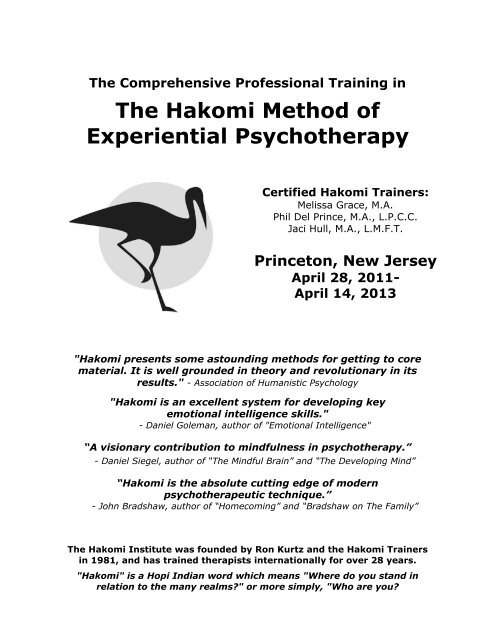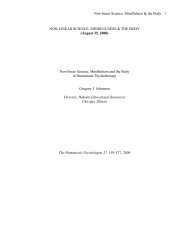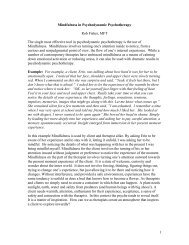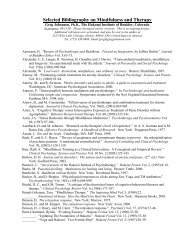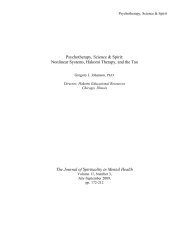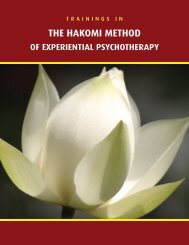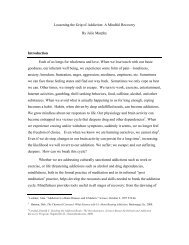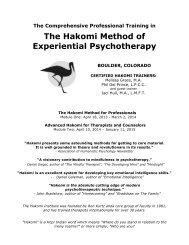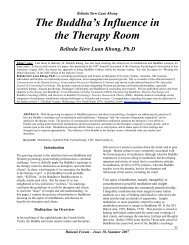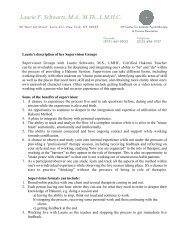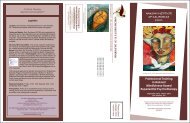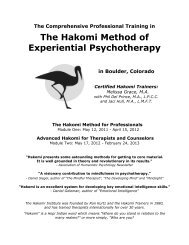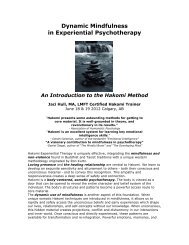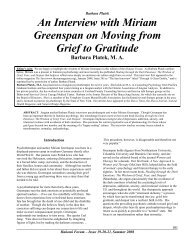The Hakomi Method of Experiential Psychotherapy - Hakomi Institute
The Hakomi Method of Experiential Psychotherapy - Hakomi Institute
The Hakomi Method of Experiential Psychotherapy - Hakomi Institute
Create successful ePaper yourself
Turn your PDF publications into a flip-book with our unique Google optimized e-Paper software.
<strong>The</strong> Comprehensive Pr<strong>of</strong>essional Training in<br />
<strong>The</strong> <strong>Hakomi</strong> <strong>Method</strong> <strong>of</strong><br />
<strong>Experiential</strong> <strong>Psychotherapy</strong><br />
Certified <strong>Hakomi</strong> Trainers:<br />
Melissa Grace, M.A.<br />
Phil Del Prince, M.A., L.P.C.C.<br />
Jaci Hull, M.A., L.M.F.T.<br />
Princeton, New Jersey<br />
April 28, 2011-<br />
April 14, 2013<br />
"<strong>Hakomi</strong> presents some astounding methods for getting to core<br />
material. It is well grounded in theory and revolutionary in its<br />
results." - Association <strong>of</strong> Humanistic Psychology<br />
"<strong>Hakomi</strong> is an excellent system for developing key<br />
emotional intelligence skills."<br />
- Daniel Goleman, author <strong>of</strong> "Emotional Intelligence"<br />
“A visionary contribution to mindfulness in psychotherapy.”<br />
- Daniel Siegel, author <strong>of</strong> “<strong>The</strong> Mindful Brain” and “<strong>The</strong> Developing Mind”<br />
“<strong>Hakomi</strong> is the absolute cutting edge <strong>of</strong> modern<br />
psychotherapeutic technique.”<br />
- John Bradshaw, author <strong>of</strong> “Homecoming” and “Bradshaw on <strong>The</strong> Family”<br />
<strong>The</strong> <strong>Hakomi</strong> <strong>Institute</strong> was founded by Ron Kurtz and the <strong>Hakomi</strong> Trainers<br />
in 1981, and has trained therapists internationally for over 28 years.<br />
"<strong>Hakomi</strong>" is a Hopi Indian word which means "Where do you stand in<br />
relation to the many realms?" or more simply, "Who are you?
<strong>The</strong> <strong>Hakomi</strong> <strong>Method</strong><br />
…is a powerful and effective, yet gentle approach to psychotherapy. It<br />
integrates the mindfulness and non-violence found in Taoist and Buddhist<br />
traditions with a unique Western methodology. <strong>The</strong> core <strong>of</strong> the Training<br />
emphasizes the innovative techniques and principles developed by Ron Kurtz<br />
and the <strong>Hakomi</strong> faculty, and the self-development and evolution <strong>of</strong> the<br />
therapist.<br />
Loving presence and the healing relationship are central to <strong>Hakomi</strong>.<br />
We learn to develop an exquisite sensitivity and attunement to others - both<br />
their conscious and unconscious material - and to convey this recognition.<br />
This creates a deep sense <strong>of</strong> safety and connection, and engages the<br />
“cooperation <strong>of</strong> the unconscious.”<br />
Current neuroscience is also revealing the basis for the effectiveness <strong>of</strong><br />
mindfulness, loving presence, empathy, and other aspects <strong>of</strong> <strong>Hakomi</strong><br />
<strong>The</strong>rapy. Neuroscience is integrated in a user-friendly framework throughout<br />
the training.<br />
<strong>The</strong> training facilitates the emergence <strong>of</strong> the essence <strong>of</strong> the<br />
practitioner. Research shows that this “therapeutic presence” and the<br />
healing relationship it facilitates are among the most significant factors in<br />
terms <strong>of</strong> the effectiveness <strong>of</strong> therapy. <strong>The</strong> self-awareness and process <strong>of</strong> the<br />
<strong>Hakomi</strong> student therefore become an essential aspect in their evolution as a<br />
therapist.<br />
<strong>Hakomi</strong> is a body-centered, somatic psychotherapy. <strong>The</strong> body is<br />
viewed as a door that can be opened to reveal the entire character and belief<br />
system <strong>of</strong> the individual. <strong>The</strong> body's structures and habitual patterns serve as<br />
powerful “indicators” – subtle access routes to unconscious and evocative core<br />
material.<br />
<strong>The</strong> dynamic use <strong>of</strong> mindfulness is also foundational to <strong>Hakomi</strong>. When<br />
integrated with unique <strong>Hakomi</strong> techniques it allows us to rapidly access the<br />
deeply held, unconscious beliefs and early experiences which shape our lives,<br />
relationships, and self-images, <strong>of</strong>ten without our knowledge. When<br />
unconscious, this hidden material creates projections, conflict and disharmony<br />
in our interactions and inner world. Once conscious and directly experienced,<br />
these patterns are available for transformation and re-integration. Powerful<br />
emotions, memories, and trauma may surface at times during the process<br />
and these are handled gently and effectively.<br />
Pr<strong>of</strong>essionals using talk therapy as a primary modality discover that the<br />
experiential nature <strong>of</strong> <strong>Hakomi</strong> enables them to accesses key unconscious<br />
material very quickly, yet safely. This experience creates a powerful “felt<br />
sense” for the client. allowing them to take greater ownership <strong>of</strong> the material,<br />
its integration, and resulting changes.
As a depth psychology, <strong>Hakomi</strong> is a direct and empowering process;<br />
and the material is also integrated cognitively for the client.<br />
<strong>The</strong> <strong>Hakomi</strong> <strong>Method</strong> is effective for both brief and long-term therapy, and<br />
is appropriate for work with individuals, couples, groups, and organizations.<br />
Curriculum Highlights<br />
- <strong>The</strong> <strong>Hakomi</strong> Principles and Techniques - <strong>The</strong> Body as Map <strong>of</strong> the Psyche<br />
- <strong>The</strong> Dynamic Use <strong>of</strong> Mindfulness - Integrated Attachment <strong>The</strong>ory<br />
- <strong>The</strong> Neuroscience <strong>of</strong> <strong>Hakomi</strong> - <strong>The</strong> Missing Experience<br />
- Loving Presence and <strong>The</strong> Healing Relationship - Creating Safety in Group Process<br />
- Character <strong>The</strong>ory and Developmental Issues - Ethics as Right Use <strong>of</strong> Power<br />
- Embracing Resistance and Defenses - Systems <strong>The</strong>ory in <strong>Hakomi</strong><br />
- Recognizing and Integrating Traumatic Processes<br />
For a detailed description <strong>of</strong> the Comprehensive Training and Curriculum,<br />
please refer to our brochure "<strong>Hakomi</strong> <strong>The</strong>rapy Trainings.”<br />
<strong>The</strong> training is primarily designed for individuals practicing and/or studying in the<br />
fields <strong>of</strong> psychotherapy, counseling and social work. However, <strong>Hakomi</strong> training<br />
has also proved invaluable when integrated with other modalities, including<br />
coaching, organizational work, consulting, education, group work, pastoral<br />
counseling, and many healing practices.<br />
DATES:<br />
<strong>The</strong> complete in-depth program comprises 60 training days.<br />
<strong>The</strong> training format consists <strong>of</strong> 15 four-day segments:<br />
2011: April 28-May 1, June 16-19, Sept. 15-18, Oct. 27-30, Dec. 8-11<br />
2012: Jan. 26-29, March 8-11, April 26-29, June 14-17, Sept. 13-16, Oct. 25-28,<br />
Dec. 6-9 2013: Jan. 17-10, Feb. 28 - March 3, April 11-14<br />
TIMES:<br />
Thursday 1:00 - 6:30 p.m., Friday and Saturday 9:30 a.m. – 6:30 p.m.,<br />
Sunday 9:00 a.m.- 2:00 p.m.<br />
TUITION:<br />
<strong>The</strong> tuition for the training is $6750.<br />
($500.00 discount if paid by start date)<br />
Payment plans, and a limited number <strong>of</strong> $500.00-$1000.00 work-study discounts<br />
are available. Discount hotel group rates and assistance with ground transportation<br />
are available for out-<strong>of</strong>-town students.<br />
One two-day <strong>Hakomi</strong> introductory workshop or class and an application<br />
serve as the prerequisite for the training. Please check with our <strong>of</strong>fice to<br />
confirm if a specific workshop qualifies as the prerequisite for this training.
<strong>The</strong> Application Deadline is March 28, 2011.<br />
<strong>The</strong> Early Application Deadline ($250. discount)<br />
Is February 28, 2011.<br />
CEU’s:<br />
NASW: This program is approved by the National Association <strong>of</strong> Social Workers<br />
(NASW Provider # 886484280).<br />
NBCC: <strong>Hakomi</strong> <strong>Institute</strong> is recognized by the National Board for Certified Counselors to<br />
<strong>of</strong>fer Continuing Education for National Certified Counselors.<br />
We adhere to NBCC Continuing Education Guidelines (Provider #5476).<br />
For more information, or to request a training brochure or application,<br />
call 303-266-1866 or email <strong>Hakomi</strong>TR@aol.com<br />
Visit the <strong>Hakomi</strong> <strong>Institute</strong> website at www.<strong>Hakomi</strong>.org<br />
What participants have said about the training:<br />
“It has been the most powerful journey I have ever taken.”<br />
- Thomas Ruettgers, M.A., Germany<br />
“A gift – a wonderful experience that will shape the rest <strong>of</strong> my life”.<br />
- Kate Mazuy, M.A., L.P.C., Colorado<br />
-<br />
"I learned so much, thoroughly enjoyed the people and process, and found the<br />
instructors awesome in the breadth and depth <strong>of</strong> their experience and knowledge"<br />
- Pat Waterman, L.C.S.W., Vermont<br />
“Excellent - rich and satisfying. It has expanded me as a person and as a therapist.<br />
<strong>The</strong> trainers were exceptional - all were superlative. <strong>The</strong> training enables you to<br />
deepen self-awareness, become more present, and learn to work with inner and<br />
outer challenges with ease, compassion and honestly - and then help others to do<br />
the same.” - Debra Babarsky, M.A., L.P.C., Virginia<br />
-<br />
“ A “10”. I cannot speak highly enough about the trainers and the consistency <strong>of</strong><br />
excellence.” - Keating C<strong>of</strong>fey, M.A., L.P.C., Colorado<br />
“Learning the <strong>Hakomi</strong> <strong>Method</strong> has been one <strong>of</strong> the most personally and<br />
pr<strong>of</strong>essionally enriching experiences <strong>of</strong> my career. I have gained tools to help my<br />
clients rapidly access and transform their pain and struggle, and found it pr<strong>of</strong>oundly<br />
effective across a wide range <strong>of</strong> individuals with a variety <strong>of</strong> long-term and<br />
challenging clinical and life problems. I can not recommend this training highly<br />
enough.” – Jeffrey Rutstein, Psy.D., Clinical Psychologist, New Jersey


